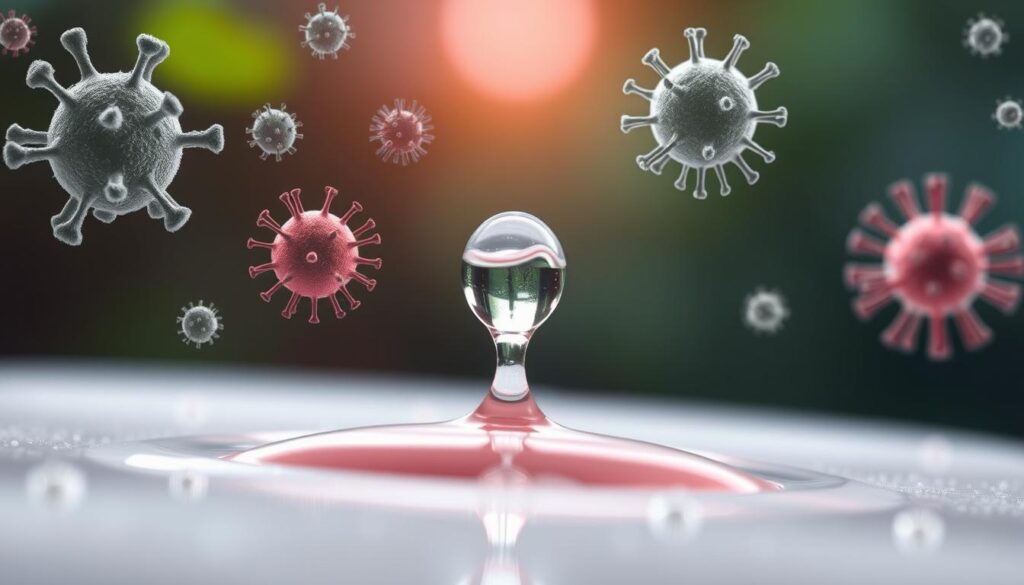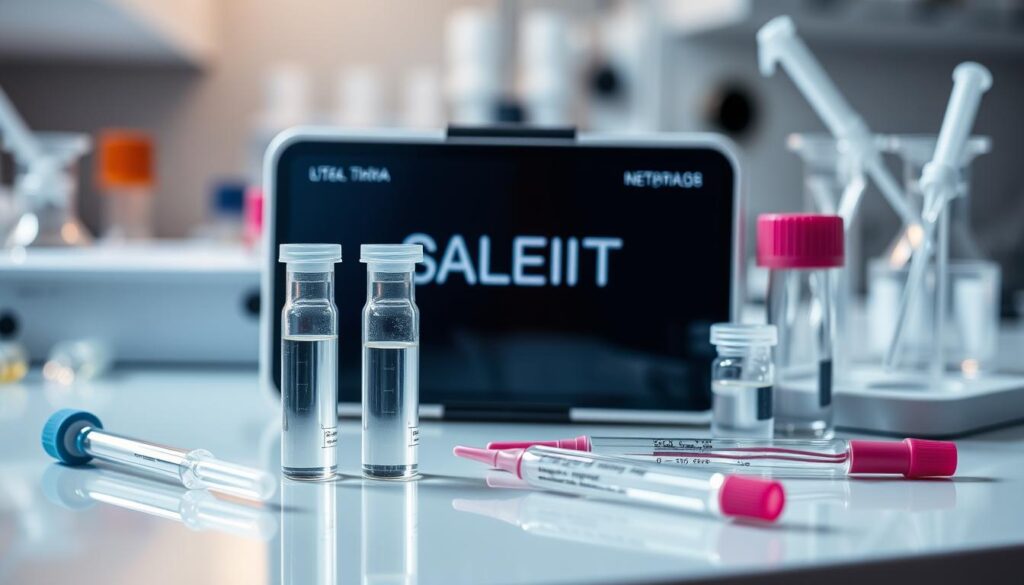Did you know the average person makes over 600 milliliters of saliva daily? This clear, tasteless liquid is key to our health. Yet, many overlook its importance. This guide will show you how saliva is more than just a lubricant for swallowing. It’s a marvel that helps with digestion and keeps our mouths clean.

We’ll dive into saliva’s makeup and how it’s made. We’ll also look at its vital roles in our bodies. From breaking down food to protecting our teeth and gums, saliva is truly powerful. Learning about it can help us stay healthy.
Key Takeaways
- Saliva is a complex, multifunctional fluid produced by the salivary glands.
- It plays a crucial role in the digestion of food, including the initial breakdown of starches.
- Saliva helps maintain a healthy pH balance in the mouth and aids in the remineralization of tooth enamel.
- Salivary glands can be affected by various disorders, leading to conditions like dry mouth or excessive saliva production.
- Saliva testing offers diagnostic potential for detecting certain medical conditions and monitoring hormone levels.
What is Saliva and Its Basic Components
Saliva, also known as spit, is a complex and essential oral fluid. It is produced by the salivary glands in our body. It plays a vital role in our health and well-being. Let’s dive into the details of saliva and its main components.
Chemical Composition of Oral Fluid
Saliva is mostly water, making up about 99% of it. The other 1% includes electrolytes, proteins, enzymes, and other compounds. The exact makeup of saliva can change based on age, diet, and health.
Key Enzymes in Saliva
Saliva has many enzymes that help with digestion and keep our mouth healthy. Some important enzymes are:
- Amylase: Breaks down starch and complex carbs
- Lipase: Helps digest fats
- Lysozyme: Fights off harmful bacteria
- Lactoferrin: Keeps the mouth healthy by stopping some bacteria growth
Properties of Salivary Secretions
Saliva has unique properties that help it perform its functions. It’s slightly acidic, with a pH between 6.2 and 7.4. This helps keep the mouth’s pH balanced. It also has antibodies and antimicrobial agents to protect against infections and keep the mouth healthy.
“Saliva is a remarkable fluid, playing a crucial role in maintaining the health and function of the oral cavity.”
The Role of Salivary Glands in Production
Saliva, the vital oral fluid, is made by special glands called salivary glands. These glands are key in making and controlling saliva. They make sure we always have enough saliva for our mouth and beyond.
In the human body, there are three main salivary glands: the parotid, submandibular, and sublingual glands. The parotid glands, in front of the ears, make the most saliva. The submandibular glands, under the jaw, and the sublingual glands, under the tongue, also help make saliva.
- The parotid glands make about 25% of the total saliva.
- The submandibular glands make around 70% of the total saliva.
- The sublingual glands make the remaining 5% of saliva.
Making saliva is a controlled process, run by the autonomic nervous system. Seeing, smelling, or tasting food, chewing, and speaking all trigger the glands. This leads to the glands making saliva, keeping our mouth moist and healthy.
“Salivary glands are the unsung heroes of the mouth, quietly working to keep it moist, healthy, and functioning.”
Understanding how salivary glands work helps us see their importance. They play a big role in our mouth and digestive health.
Primary Functions of Saliva in Digestion
Saliva, or oral fluid, is key in digestion. It breaks down food, moistens it, and starts digesting starches.
Enzymatic Breakdown of Food
Saliva has enzymes like amylase and lipase. They start breaking down carbs and fats. This makes food easier for the body to digest and absorb.
Moistening and Bolus Formation
When we chew, salivation moistens the food. It turns it into a soft, easy-to-swallow mass called a bolus. This helps food move from the mouth to the stomach.
Initial Starch Digestion
Saliva’s amylase enzyme breaks down starches into simple sugars. This step prepares food for more digestion in the small intestine.
| Key Saliva Functions in Digestion | Description |
|---|---|
| Enzymatic Breakdown | Saliva contains enzymes that begin the chemical breakdown of food components, including carbohydrates and fats. |
| Moistening and Bolus Formation | Saliva helps moisten food, creating a soft, cohesive mass (bolus) that is easier to swallow. |
| Initial Starch Digestion | The enzyme amylase in saliva starts the breakdown of complex carbohydrates, such as starches, into simpler sugars. |
In summary, oral fluid is vital for digestion. It helps break down food, forms a bolus, and prepares it for further digestion.
Protective Properties of Oral Fluid
Saliva, or oral fluid, is key to our oral health. It has many protective functions. These help keep our mouth and teeth healthy.
One main role of saliva is to lubricate and protect our oral tissues. This prevents damage and keeps them working well. It also acts as a shield, protecting us from harmful chemicals and abrasives.
Saliva is also great at neutralizing acids. Our mouths face acidic threats from food, drinks, and bacteria. Saliva keeps the pH balance right, protecting our teeth from decay.
- Saliva’s lubricating properties protect oral tissues from friction and damage.
- It acts as a barrier, shielding the mouth from environmental threats.
- Saliva’s buffering action neutralizes harmful acids, preserving tooth enamel.
Besides these, saliva helps keep our mouths clean. It has antimicrobial properties that fight off bad bacteria. This stops plaque from forming, which can lead to tooth decay and gum disease.
In short, oral fluid has many protective roles. It lubricates, acts as a barrier, regulates pH, and fights bacteria. These roles make saliva essential for our oral health.

Saliva’s Role in Oral Health Maintenance
Saliva, also known as oral fluid, is crucial for our mouth’s health. It does more than help with digestion. It has special properties that keep our teeth and gums healthy.
Antimicrobial Properties
Saliva has strong antimicrobial powers. It contains enzymes like lysozyme and lactoperoxidase. These enzymes stop harmful bacteria from growing in our mouths.
This stops dental plaque from forming. Plaque is a big cause of tooth decay and gum disease.
pH Balance Regulation
Saliva also helps keep our mouth’s pH balanced. It neutralizes acids, keeping the pH healthy. This is key for keeping our tooth enamel strong.
Tooth Remineralization Process
Saliva helps our teeth by remineralizing them. It has minerals like calcium and phosphate. These minerals help rebuild and strengthen our teeth’s outer layer.
This process fights off acid erosion and tooth decay. It keeps our teeth healthy and our smiles bright.
“Saliva is the unsung hero of oral health, playing a vital role in maintaining the delicate balance of our mouths.”
Common Disorders Affecting Salivation
Saliva is key to keeping our mouths healthy. But, many disorders can mess with how much we make and how it flows. The two main issues are hypersalivation (too much saliva) and xerostomia (not enough saliva).
Hypersalivation (Ptyalism) means we make too much saliva. This can cause us to drool a lot or have trouble swallowing. It might happen because of medicines, brain problems, some mouth infections, or radiation therapy side effects. Signs include trouble speaking, swallowing, and feeling embarrassed in public.
Xerostomia is when we don’t make enough saliva, making our mouth dry. It can be due to medicines, autoimmune diseases, radiation, or aging. Symptoms include trouble chewing and swallowing, more cavities, and always feeling like your mouth is dry.
Both hypersalivation and xerostomia can really affect our mouth health and how we feel. Seeing a doctor is important to find out why and get help to manage these issues.
Diagnostic Value of Saliva Testing
Saliva is more than just what we spit out every day. It’s a key tool in medicine. It’s a non-invasive way to check our health, unlike blood tests.
Medical Conditions Detection
Saliva tests can spot many health issues. They find biomarkers and track disease. This includes sialorrhea, hormonal problems, and some cancers.
Hormone Level Assessment
Testing hormones in saliva is getting popular. It’s easier than blood tests. It helps doctors keep an eye on hormone levels in our bodies.
Drug Testing Applications
Saliva tests are great for drug checks. They’re used in law, work, and sports. They find many drugs, including illegal ones and alcohol.
Saliva testing is growing in medicine. It helps find diseases early and tailor treatments. This fluid is changing how we check and care for our health.
“Saliva testing is a game-changer in the world of medical diagnostics, offering a convenient and non-invasive alternative to traditional methods.”
Managing Excessive Salivation (Hypersalivation)
Excessive salivation, or hypersalivation, is when your body makes too much saliva. It can be annoying and embarrassing. But, there are ways to handle it.
Finding out why you have too much saliva is key. It could be because of a neurological disorder, some medicines, dental problems, or stress. Fixing the cause helps lower saliva and makes life better.
Changing your lifestyle is a big step in managing too much saliva. This means eating differently, cutting down on stress, and keeping your mouth clean. You might also need medicines like anticholinergic drugs to control saliva.
For serious cases, doctors might suggest Botox, surgery, or radiation to the salivary glands. These are for when other treatments don’t work.
People with hypersalivation, ptyalism, or sialorrhea should talk to their doctors. Together, they can find the right treatment. This way, you can manage your saliva and feel better.
| Treatment Strategies for Hypersalivation | Description |
|---|---|
| Lifestyle Changes | Adjusting diet, reducing stress, and maintaining good oral hygiene |
| Medication | Anticholinergic drugs to regulate saliva production |
| Medical Procedures | Botox injections, salivary gland surgery, or radiation therapy |
“Managing excessive salivation requires a multifaceted approach, addressing both the underlying causes and implementing effective treatment strategies to improve the patient’s quality of life.”
Treatment Options for Dry Mouth (Xerostomia)
Dry mouth, or xerostomia, affects many people. It can harm your oral health and overall health. Luckily, there are many ways to treat it and boost saliva production.
Changing your lifestyle is a key step. Drinking water often, avoiding tobacco and alcohol, and cutting down on caffeinated drinks helps. Using a humidifier at home or work also keeps your mouth moist.
There are also over-the-counter products like saliva substitutes and lubricants. They can temporarily moisten your mouth. These come as sprays, lozenges, or gels and are used as needed.
If simple changes and over-the-counter products don’t work, prescription drugs might be needed. Some medications, like salivary stimulants, can increase saliva production. Others treat the underlying cause, like Sjögren’s syndrome or diabetes.
In serious cases, more drastic measures like salivary gland transplantation or surgical devices might be considered. These are usually for those who haven’t seen improvement with other treatments.
It’s crucial to work with a healthcare professional to find the best treatment for xerostomia. By tackling the cause and using a mix of treatments, you can manage dry mouth and keep your mouth healthy.
Latest Research and Medical Applications
Saliva testing and oral fluid diagnostics have seen big leaps forward. Scientists are finding new ways to use saliva, leading to breakthroughs in health care.
Biomarker Discovery
Saliva testing is now a key tool for finding biomarkers. This helps doctors understand a person’s health. It’s helping to spot diseases early, like cancer and heart problems.
This means we can get better care without invasive tests. It’s all about making health care more personal and easy.
Therapeutic Developments
Researchers are also looking into how saliva can help treat diseases. Saliva’s proteins and enzymes might lead to new medicines. They could fight off infections and help heal wounds.
Future Diagnostic Potential
The future of saliva testing looks bright. New tech, like biosensors and AI, will make tests better. This will help find diseases sooner and treat them more effectively.
Imagine a world where health care is more precise and personal. Saliva testing could make that a reality, changing how we approach medicine.

| Biomarker Discovery | Therapeutic Developments | Future Diagnostic Potential |
|---|---|---|
| – Early diagnosis of medical conditions – Saliva as a valuable biofluid for detecting biomarkers | – Antimicrobial properties for treating oral infections – Regenerative capabilities for tissue engineering and wound healing | – Integration of biosensors and AI for enhanced accuracy and accessibility – Revolutionizing personalized medicine through saliva testing |
Conclusion
Saliva, or oral fluid, is key to our health and well-being. It helps with digestion and protects our teeth. This fluid is truly amazing.
The salivary glands work hard to make saliva. It’s vital for breaking down food and keeping teeth strong. Saliva also helps in medical tests, opening new ways to find and treat diseases early.
Good oral care is important for our saliva to work right. Regular dental visits and clean habits keep our mouths healthy. As we learn more about saliva, the future of health care looks bright.
FAQ
Q: What is saliva and what are its basic components?
A: Saliva, also known as oral fluid, is a complex bodily fluid. It’s made by the salivary glands. It mainly has water, electrolytes, proteins, enzymes, and other compounds.
Q: How do the salivary glands produce saliva?
A: The salivary glands in the mouth work together to make saliva. The nervous system controls how much saliva is made. This depends on food, chewing, and emotions.
Q: What are the primary functions of saliva in the digestive process?
A: Saliva is key in digestion. It breaks down food, especially starches, and moistens it. It also helps swallow food and starts digesting some nutrients.
Q: How does saliva help maintain oral health?
A: Saliva protects the mouth. It lubricates, protects tissues, and fights off harmful bacteria. It also helps prevent tooth decay by remineralizing enamel.
Q: What are some common disorders that can affect salivation?
A: Two common issues are too much saliva (hypersalivation) and dry mouth (xerostomia). Hypersalivation can be caused by many things, like medicines or medical treatments. Xerostomia leads to oral health problems because of less saliva.
Q: How can saliva testing be used for diagnostic purposes?
A: Saliva testing is useful for diagnosing diseases. It can check for medical conditions, hormone levels, and drugs. It’s a non-invasive way to test, unlike blood tests.
Q: How can excessive salivation (hypersalivation) be managed?
A: Managing too much saliva involves finding and fixing the cause. This might mean changing your diet or using medicines. Sometimes, Botox or surgery is needed.
Q: What are the treatment options for dry mouth (xerostomia)?
A: Treating dry mouth involves several steps. You might change your lifestyle, use saliva substitutes, or take medicines. In some cases, medical treatments are needed.
